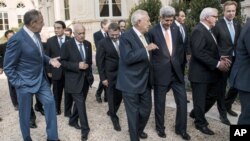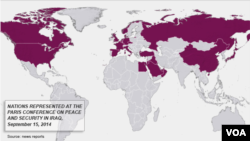About 30 countries have pledged to support Iraq in its fight against Islamic State militants by "all means necessary" including military aid.
In a statement following a Monday conference in Paris on the crisis, diplomats said aid should come in line with "needs expressed by the Iraqi authorities, in accordance with international law and without jeopardizing civilian security."
The conference included officials from about 30 countries, the United Nations, European Union and the Arab League. It is the latest step in an effort to build a coalition to battle the Islamic State group, which has taken over large areas in northern and western Iraq as well as eastern Syria.
French President Francois Hollande said there is "no time to lose" in the fight against Islamic State militants. He said Iraq's fight is global, and the international community must respond clearly, loyally and strongly. Besides posing a threat to the Middle East, the Islamic State is a menace for Western nations like France, where authorities estimate roughly 1,000 people have left to join the jihadist movement, he added.
Hollande said the world community must do everything to fight against the indoctrination and recruitment of its youth, crush jihadist networks, deprive the Islamic State of its financial resources and punish those who assist it.
The talks follow a tour of the Middle East by U.S. Secretary of State John Kerry to gain support for President Barack Obama's plan to deal with Islamic State. Kerry said a growing number of countries are prepared to join the fight, including several Arab Nations offering to give military aid and carry out airstrikes, if needed.
Iran
Iran was not invited to the conference. On Monday, the United States ruled out military coordination with Iran involving Islamic State militants in Iraq but said it is open to future talks. Iran's Supreme Leader Ayatollah Ali Khamenei said the U.S. ambassador in Iraq asked for Iran's cooperation, but that the request was rejected because the U.S. has "dirty hands."
Iraqi President Fouad Massoum told the Associated Press that it is not necessary for Arab powers to conduct airstrikes, saying what is needed is for them to "participate in the decisions" of the conference.
He highlighted the importance of taking action against the Islamic State group, saying it is "in the interest of everyone."
"If this group installs itself in Iraq, this will create of a lot of problems in Iraq, the region and the world," Massoum said. "We must try to be helped by other countries so there is international mobilization against this group that wants to install itself in Iraq and from there unleash itself on the world."
Massoum said he thinks Iran should have been invited, given the long shared border with Iraq and the humanitarian aid Iran has been providing during the crisis.
French officials said Monday their aircraft were due to begin reconnaissance flights over Iraq.
Lisa Bryant contributed to this report from Paris, France








